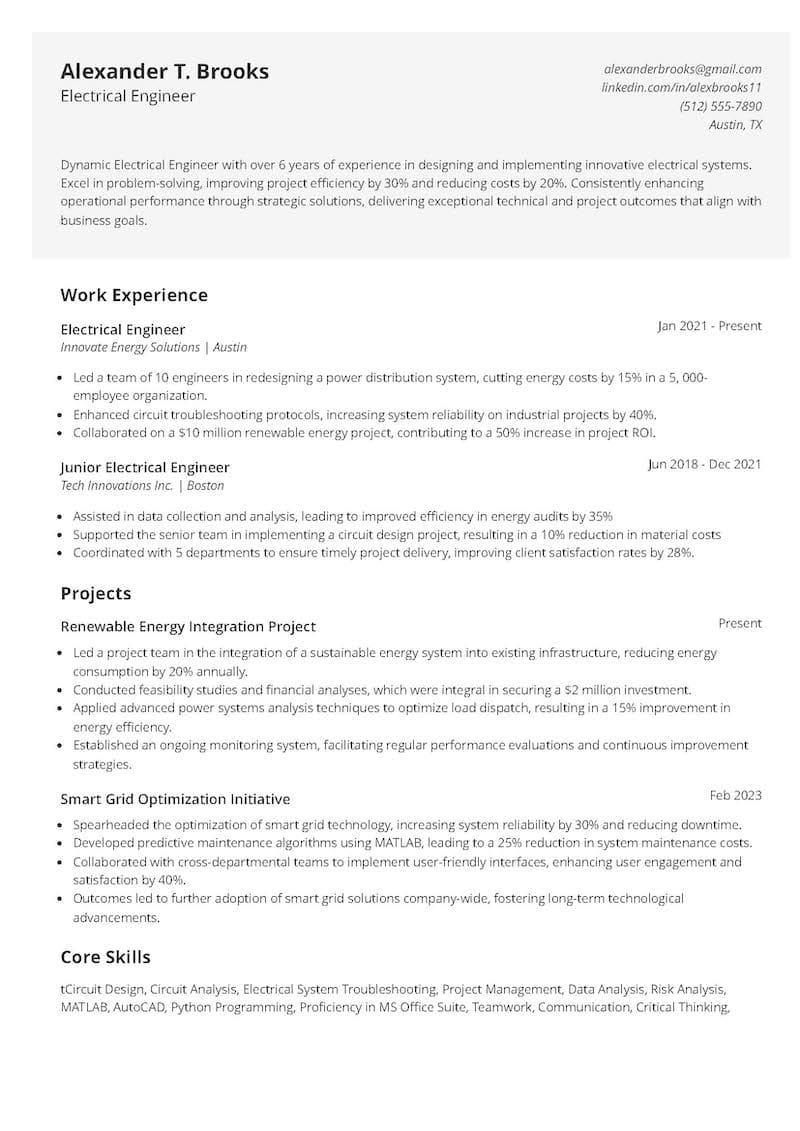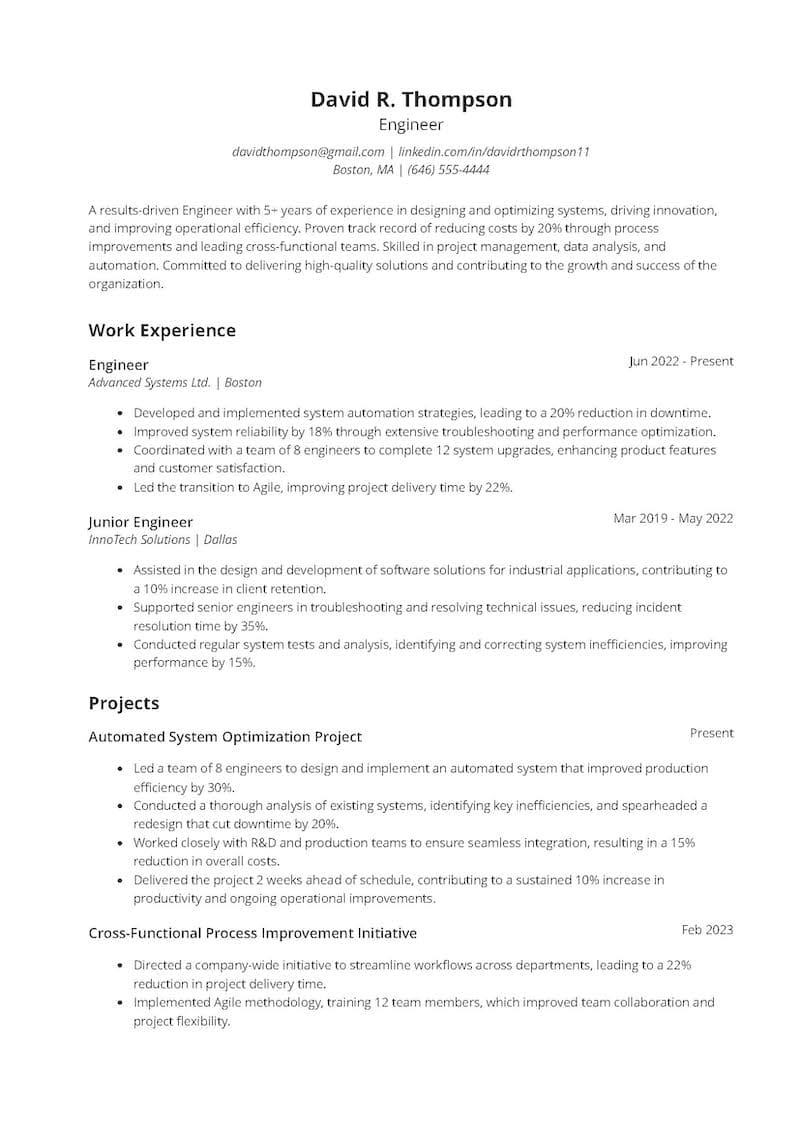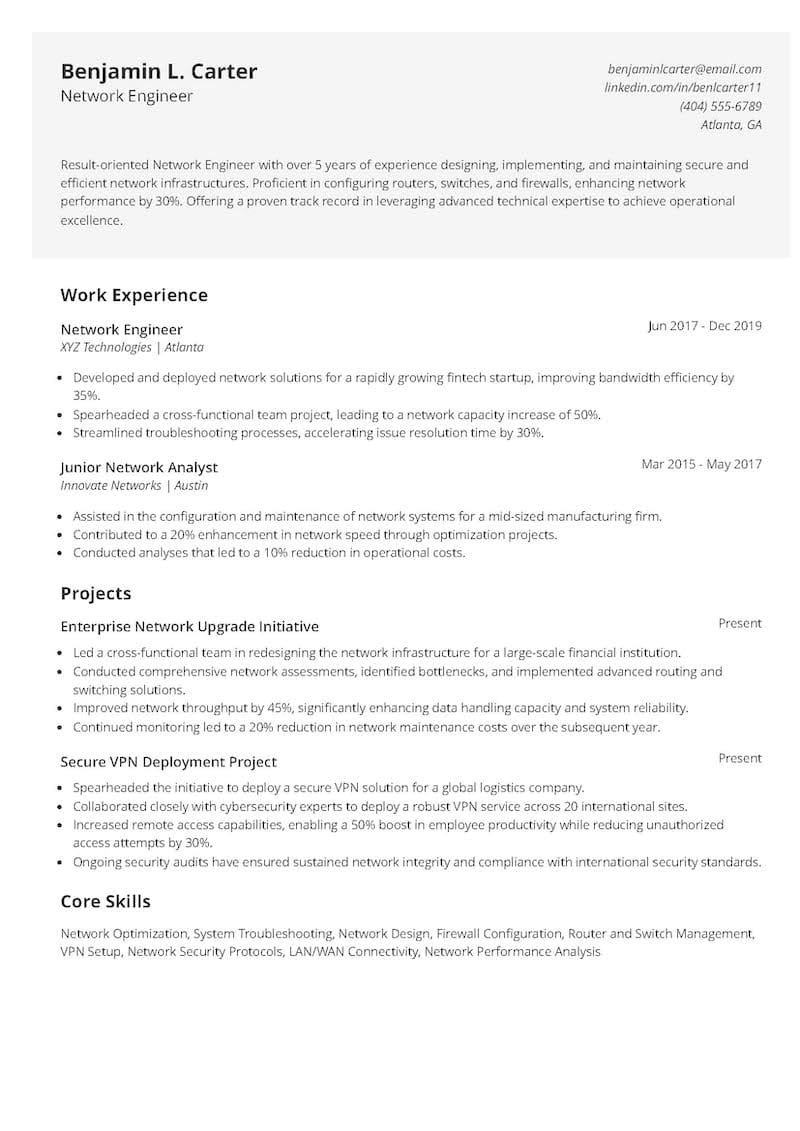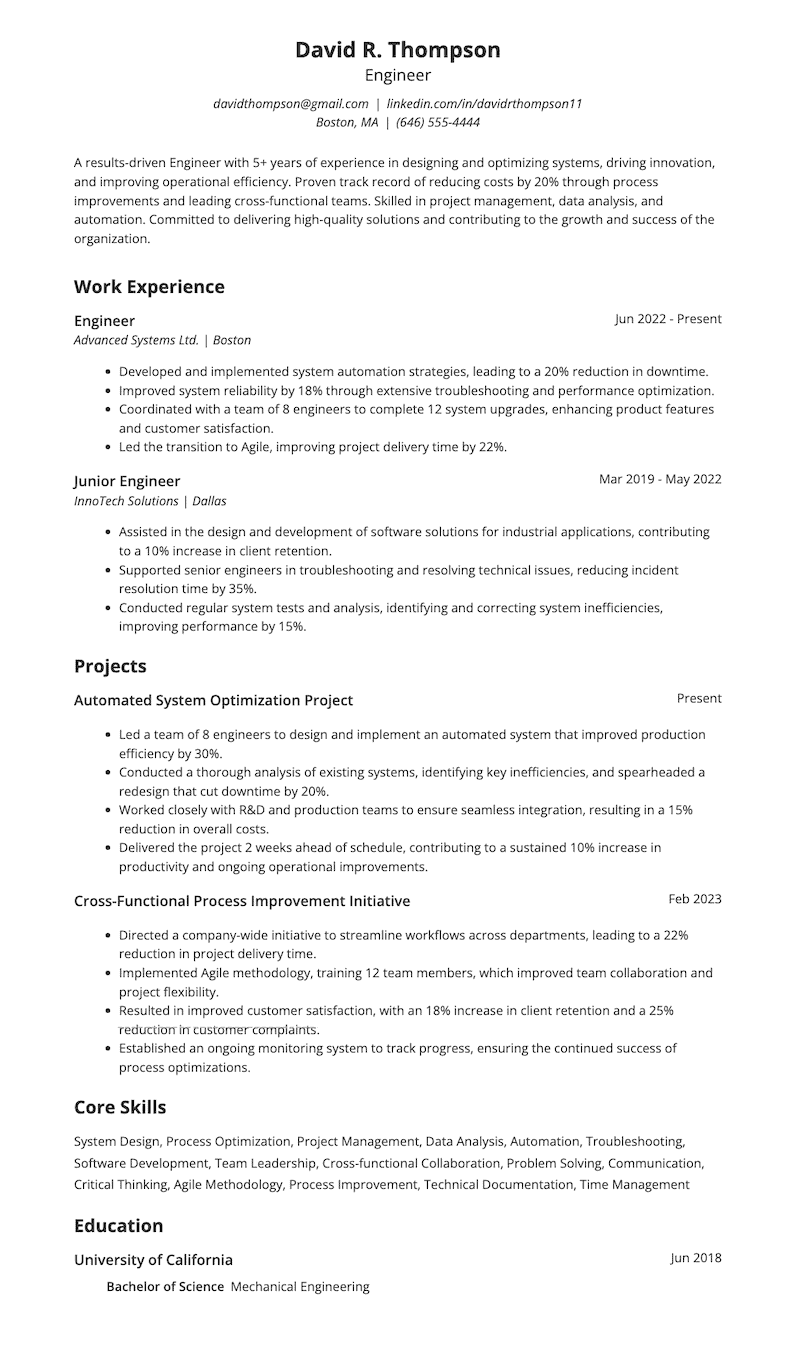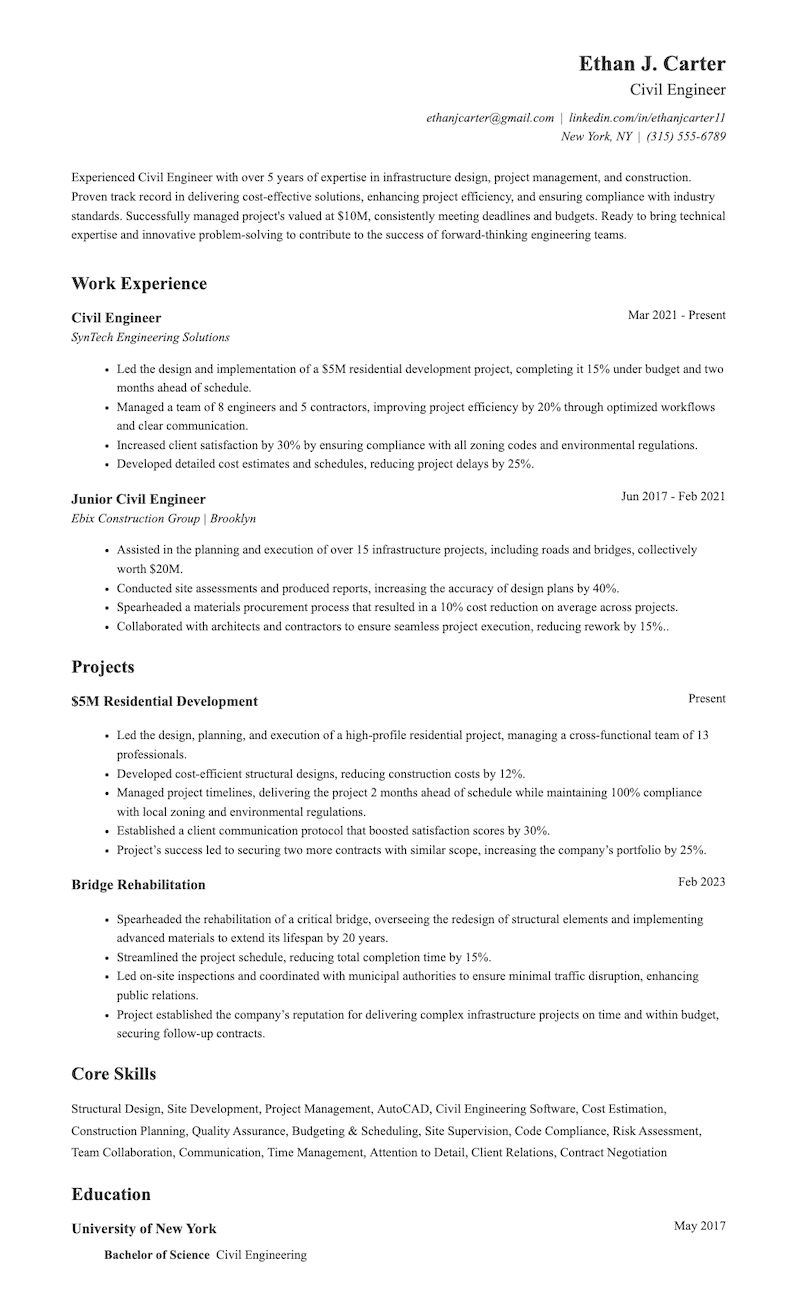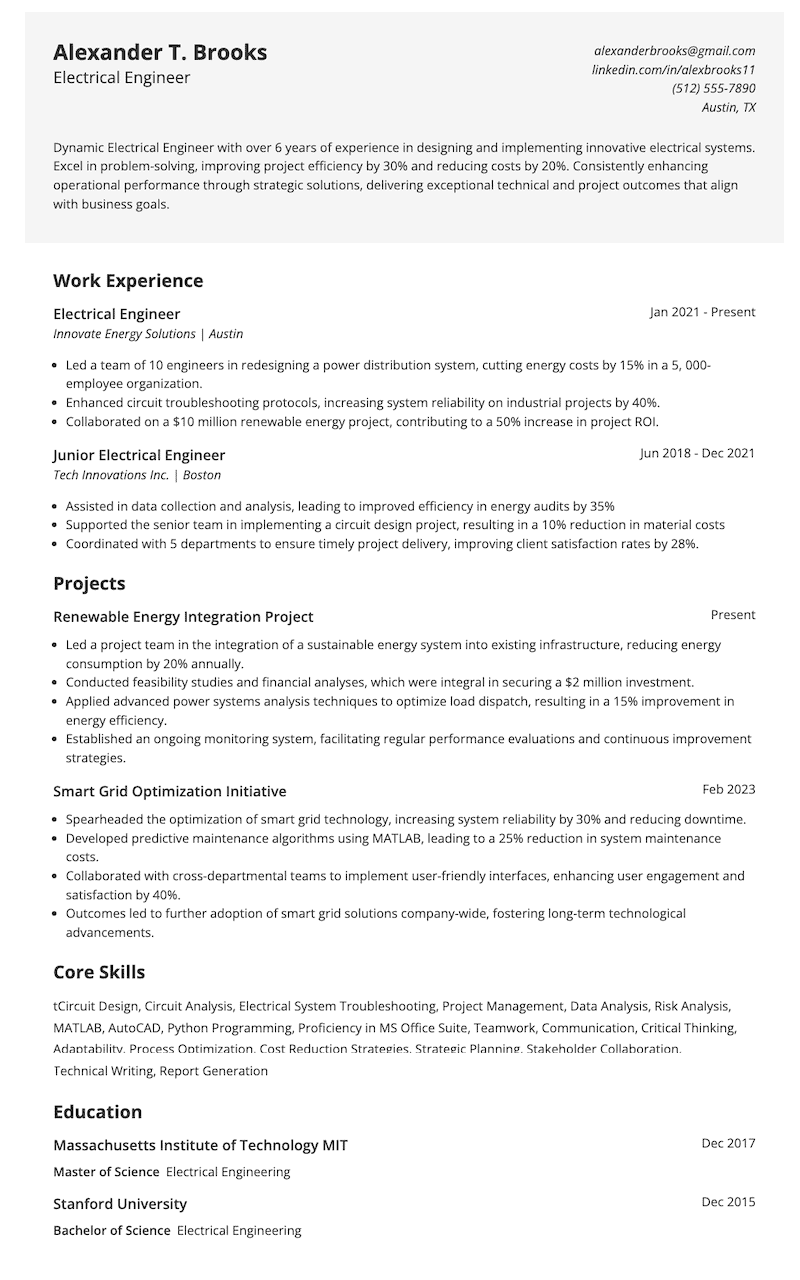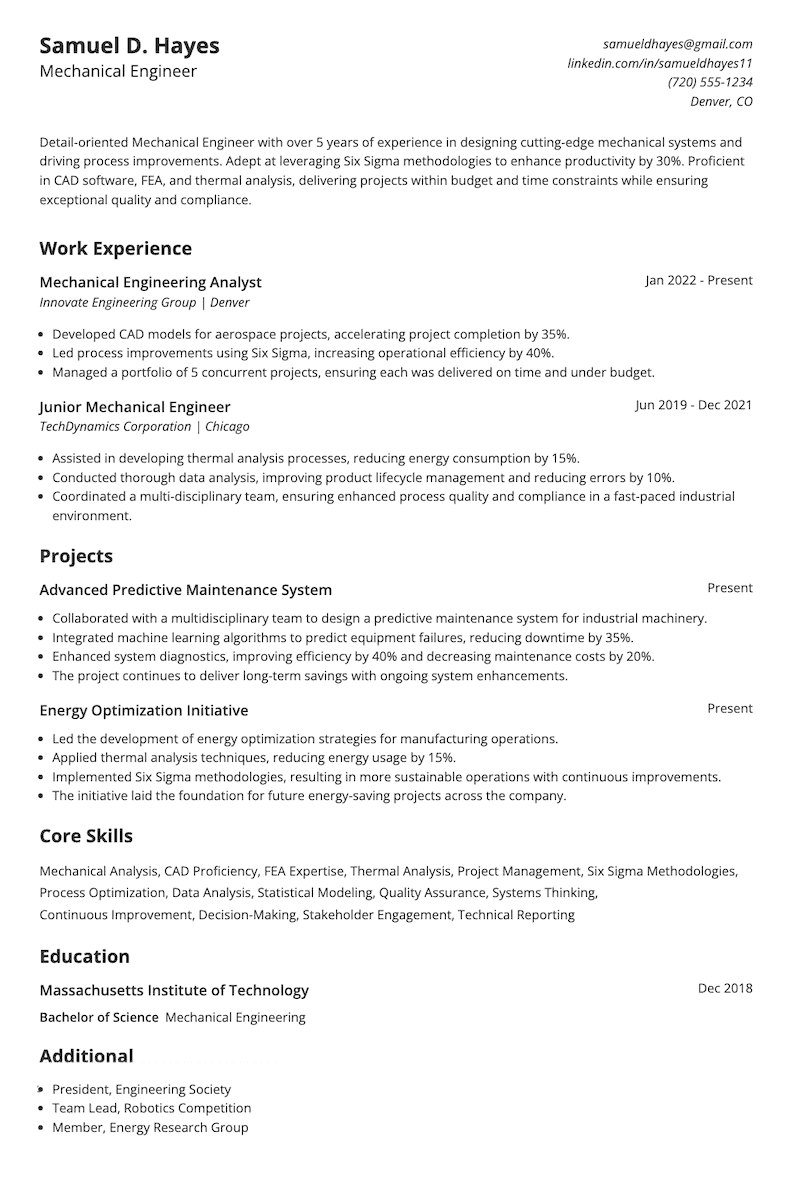Engineering Resume Examples & Tips to Land More Interviews
Explore engineering resume examples and expert tips to create an ATS-friendly resume that highlights your skills, experience, and achievements to secure more job interviews.

July 15, 2021

Engineers play a crucial role in driving innovation and shaping the future of various industries. This blog offers carefully designed resume samples and practical tips to help you create a compelling engineering resume that stands out.
Employers seek engineers with strong technical expertise, problem-solving skills, and industry knowledge. A well-structured resume tailored to the job description can significantly boost your chances of landing an interview.
Want to craft a resume that grabs attention and gets results? Keep reading to learn how to showcase your skills effectively and make a lasting impression on hiring managers!
Engineer resume example
Looking for an engineering job? A strong resume can make all the difference. Below is a sample engineering resume that highlights achievements, technical expertise, and problem-solving skills in a clear, structured way.
Employers want to see more than just job titles—they’re looking for impact, skills, and results.
This engineering resume template showcases a strong blend of engineering expertise, system optimization, and process improvement. The Automated System Optimization Project highlights hands-on experience in automation, directly contributing to efficiency gains and cost reduction.
Furthermore, work experience demonstrates proficiency in system reliability, troubleshooting, and Agile project management, making it clear the candidate excels in both technical and leadership roles.
With a solid foundation in mechanical engineering and a track record of measurable impact, this resume effectively positions the candidate as a valuable asset for engineering and operational efficiency roles.
Civil engineer resume example
If you’re a Civil Engineer seeking new opportunities, this resume example shows how to highlight key skills and achievements effectively. Emphasizing project management, structural design, and site development will showcase your ability to lead successful projects.
Demonstrating expertise in construction planning, cost estimation, and compliance ensures you stand out as a candidate who can drive efficiency and deliver results in engineering projects.
With a strong emphasis on project leadership, cost efficiency, and structural design expertise, this resume makes a perfect example of a civil engineer resume. For instance, the $5M residential development project showcases the ability to deliver under budget and ahead of schedule, highlighting strong project management skills. The bridge rehabilitation project further demonstrates expertise in complex infrastructure, with quantifiable results like extending the bridge’s lifespan and streamlining schedules.
These specific achievements, coupled with clear metrics like cost reduction and client satisfaction increases, make a compelling case for the candidate’s effectiveness.
Electrical engineer resume example
Looking to advance your career as an Electrical Engineer? Your resume should highlight technical expertise, problem-solving skills, and the impact you’ve made. The resume below emphasizes key achievements, industry tools, and project leadership, giving you a strong edge in the job market.
As an Electrical Engineer, focus on showcasing your expertise in circuit design, system optimization, and cost-saving strategies while aligning your accomplishments with business goals.
This resume excels in its focus on quantifiable achievements within electrical engineering. The work experience section highlights specific results, such as cutting energy costs by 15% and increasing system reliability by 40%, showcasing a direct impact on operational performance.
The projects section further strengthens this by detailing initiatives like the Renewable Energy Integration and Smart Grid Optimization, where metrics like a 20% reduction in energy consumption and a 30% increase in system reliability underscore the candidate’s ability to deliver innovative and effective solutions. These sections effectively demonstrate the candidate’s capacity to translate technical expertise into tangible business value.
Mechanical engineer resume example
Looking to land a Mechanical Engineering role? Employers seek candidates who can design efficient systems, optimize processes, and drive innovation. Check out this Mechanical Engineering resume example that effectively highlights key skills and accomplishments in a way that stands out.
Showcasing expertise in CAD, FEA, and process optimization is key. A structured format with quantifiable achievements ensures your experience and impact are clear at a glance.
This resume immediately grabs attention with a strong professional summary highlighting the candidate’s experience in designing cutting-edge mechanical systems and driving process improvements. This is further supported by the core skills section, which effectively showcases a blend of technical expertise, such as CAD proficiency and FEA expertise, alongside process optimization skills like Six Sigma methodologies.
The combination of these sections clearly establishes the candidate’s ability to not only design but also to enhance productivity and deliver results, setting a solid foundation for the detailed experience and project accomplishments that follow.
Network engineer resume example
Are you a network engineer looking for a new job? Your resume needs to do more than just list your experience—it should highlight your impact and make hiring managers take notice. Below is a great example of a well-structured, results-driven resume that gets attention.
A strong resume is clear, easy to scan, and packed with measurable results.
This resume template is structured for impact, showcasing expertise in network optimization, security, and infrastructure upgrades. Strong technical skills, such as firewall configuration and VPN deployment, are clearly presented, making them easy to scan. Each experience section highlights measurable achievements, including efficiency improvements and cost reductions, reinforcing results-driven contributions.
Additionally, the projects section demonstrates leadership in large-scale network upgrades and security enhancements, proving real-world impact. With a clear, organized layout and a focus on tangible outcomes, this resume effectively communicates technical proficiency and career growth in network engineering.
Also Read: The Top 5 ATS Resume Keywords of 2025
How to write an engineer resume that will get you an interview?
Creating an engineer resume that stands out is essential to securing an interview. To catch the attention of hiring managers and potential employers, you need to highlight your skills, qualifications, and experience clearly and effectively.
An Applicant Tracking System (ATS) is used by many companies to streamline the hiring process. These systems scan resumes for keywords, formatting, and relevant information before they are reviewed by hiring managers. A resume that is ATS-friendly ensures it passes through the system and reaches the decision-makers, improving your chances of securing an interview.
How ATS works:
- Job posting creation and distribution: Employers input job details into the ATS, which then disseminates these postings across various job boards and social media platforms.
- Application collection and storage: The ATS gathers incoming applications, storing each candidate’s information in a centralized database.
- Searchable candidate database: Recruiters can query the database using relevant keywords to identify suitable candidates efficiently.
By making your resume ATS-friendly, you ensure it’s more likely to make it to the hands of a hiring manager.
Jobscan’s resume builder is a free tool for creating ATS-friendly resumes. It allows you to tailor your resume to match specific job descriptions, increasing your chances of getting noticed by hiring managers and passing the ATS screening process.
Scan your resume
Use Jobscan's resume scanner to ensure your engineering resume is ATS-friendly and includes all the necessary keywords from the job description.
Optimize your resume
1. Key elements of a engineer resume
A successful engineer resume should include the following key components:
- Contact information: Full name, phone number, email, and LinkedIn or portfolio link.
- Professional summary: A brief section that highlights your most important skills and experience.
- Core skills: A bullet-point list of relevant technical and soft skills.
- Experience: Detailed descriptions of your previous roles, focusing on achievements and key responsibilities.
- Education: Information about your degrees, certifications, and any relevant coursework.
- Certifications and training: Highlight industry-specific certifications, software proficiencies, or other relevant training.
- Projects: Showcase any engineering projects you’ve worked on, especially if they demonstrate your technical expertise.
- Awards and accomplishments: Any relevant recognition or achievements that distinguish you in your field.
2. Write a strong professional summary
Your professional summary serves as an introduction to your resume. It should be concise and focused on showcasing your experience, expertise, and what you bring to the table as an engineer. Here’s how to craft an effective one:
- Be specific: Focus on your strongest skills, relevant experience, and any unique contributions you’ve made in your career.
- Tailor to the job: Customize the summary to align with the specific role you’re applying for.
- Keep it concise: Aim for 3–4 sentences that summarize your value and career highlights.
Good examples of a resume summary
- “Detail-oriented Civil Engineer with 5+ years of experience in project management and structural design. Skilled in using AutoCAD, Revit, and SAP2000 to design and oversee large-scale projects. Proven track record of delivering projects on time and within budget while ensuring compliance with industry standards and safety regulations.”
- “Results-driven Software Engineer with 7 years of experience in full-stack development. Expertise in Java, Python, and cloud-based technologies, with a passion for building scalable and efficient applications. Strong communicator with a collaborative approach to problem-solving.”
Bad examples of a resume summary
- “Quality assurance engineer looking for a job. I have experience in many areas of engineering and can adapt to any task.”
- “Hardworking engineer with some experience in the engineering discipline. I am looking to grow and improve my skills and contribute to a successful company.”
Jobscan’s Resume Summary Generator helps you quickly create a compelling professional summary by analyzing your skills and experience. It provides optimized, ATS-friendly summaries tailored to your target job, ensuring your resume is concise, impactful, and includes the right keywords to catch recruiters’ attention.
3. Demonstrate key engineering skills
When writing an engineer resume, it’s essential to showcase both hard and soft skills that are relevant to the position. This helps you stand out and demonstrate your full potential to employers.
Hard skills
Hard skills are the technical abilities and knowledge you acquire through education or experience. Examples include:
- Proficiency in software (e.g., AutoCAD, SolidWorks, MATLAB)
- Data analysis and statistical modeling
- Engineering design and simulation
- Programming languages (e.g., Python, Java, C++)
- CAD modeling and drafting
- Project management tools (e.g., Microsoft Project, Asana)
Soft skills
Soft skills are interpersonal and communication abilities that are important in the workplace. For engineers, these can include:
- Problem-solving and critical thinking
- Teamwork and leadership
- Communication skills (both written and verbal)
- Time management and organization
- Attention to detail
- Adaptability and flexibility
Integrating these skills into your bullet points can help you show off your accomplishments and highlight your proficiencies. But there’s a right and wrong way to highlight your engineering skills in your bullet points.
4. Craft impactful resume bullet points for engineers
Good examples of resume bullet points
- “Designed and implemented a system that reduced operational costs by 20% using Python and data analysis techniques.”
- “Led a team of 5 engineers in the successful completion of a $2M project ahead of schedule, maintaining 100% compliance with safety standards.”
- “Developed a new product prototype, resulting in a 15% improvement in efficiency and a 10% reduction in production costs.”
Bad examples of resume bullet points
- “Worked on engineering projects.”
- “Helped with tasks and assisted team members.”
- “Designed and developed stuff for the company.”
Looking to make your resume bullet points more impactful? Jobscan’s Bullet Point Generator helps you create strong, ATS-friendly statements that highlight your achievements. It provides action-driven, tailored suggestions to present your experience clearly and effectively. With this tool, you can craft results-oriented bullet points that showcase your skills and make your resume stand out.
5. Highlight your achievements as an engineer
Employers want to know how you can contribute to their team, so it’s important to showcase your achievements. Quantify your accomplishments wherever possible (e.g., reduced costs by X%, increased efficiency by Y%). This helps hiring managers understand the value you can bring to the company. Here are some examples of how you can highlight your impact:
- “Designed and implemented a new automation system, reducing production costs by 20%.”
- “Led a team to develop a structural design that improved building safety and reduced material costs by 15%.”
- “Optimized a manufacturing process, increasing efficiency by 25% and cutting waste by 10%.”
- “Developed a software solution that enhanced system performance, reducing processing time by 30%.”
6. Tailor your resume to the job description
Customizing your resume to match the job description is essential for grabbing recruiters’ attention and passing Applicant Tracking Systems (ATS). A targeted resume not only improves ATS compatibility but also proves you’re a strong fit for the role.
A generic resume won’t make you stand out. Aligning your skills, qualifications, and experience with the job description shows your understanding of the role and highlights your most relevant strengths.
Follow these steps to tailor your resume effectively:
- Analyze the job description – Identify key skills, qualifications, and industry-specific terms.
- Match your skills – Emphasize experience that directly aligns with the role.
- Use job-specific keywords – Optimize for ATS by incorporating relevant terms.
- Showcase relevant achievements – Focus on measurable results that demonstrate impact.
- Customize your summary – Highlight skills and experience that match the job.
- Highlight certifications and training – Ensure key credentials stand out.
- Adjust your experience section – Prioritize relevant roles and accomplishments.
A well-tailored resume increases your chances of landing an interview by showing employers exactly why you’re the right fit for the job.
7. Include relevant education and certifications
Having the right academic background and certifications can make a significant difference in securing an engineering role. Here’s how to present your education and certifications effectively for an engineering role:
- List your degree, major, and institution in a clear format (e.g., Bachelor of Science in Mechanical Engineering, XYZ University).
- If you’re a recent graduate, include your graduation year, relevant coursework, or academic honors.
- For experienced engineers, keep it concise and highlight advanced degrees or specialized training.
- If transitioning into engineering from another field, mention coursework or certifications relevant to your new role.
- Showcase industry-recognized certifications that enhance your technical expertise (e.g., Professional Engineer (PE) License, Six Sigma Certification).
- If you specialize in a specific engineering discipline, include relevant credentials like Certified Manufacturing Engineer (CMfgE) or LEED Accreditation.
- Seasoned professionals should focus on widely recognized certifications rather than listing every past training program.
Top engineer certifications
- Certified Engineering Technician (CET)
- Professional Engineer (PE) License
- Six Sigma Certification (Green Belt, Black Belt)
- Certified Manufacturing Engineer (CMfgE)
- Project Management Professional (PMP)
- Autodesk Certified Professional (for CAD tools like AutoCAD)
- Certified ScrumMaster (CSM) for Agile engineering roles
Engineer resume tips
Creating a standout engineer resume involves more than just listing your skills and experience. Here are a few important tips to ensure your resume gets noticed:
- Focus on relevant skills: Highlight skills that are most important for the job you’re applying for. Tailor your resume to match the role’s requirements.
- Use action verbs: Start your bullet points with strong action verbs like “engineered,” “designed,” or “developed” to make your achievements stand out.
- Quantify your achievements: Whenever possible, add numbers or percentages to show the impact of your work, such as cost savings, time reductions, or efficiency improvements.
- Keep it concise: Limit your resume to one or two pages. Focus on the most relevant experience and avoid unnecessary details.
- Proofread: Make sure your resume is error-free. A polished resume shows attention to detail.
- Personalize for each role: Adapt your resume to highlight skills and experience that match the job description.
Also Read: 10 Best Resume Skills to Put on a Resume
Include a cover letter with your engineer resume
A cover letter adds a personal touch to your application and provides a chance to explain why you’re the right fit for the role.
What to include in your cover letter:
- Begin with a strong opening that conveys your excitement for the role and the company.
- Express your enthusiasm for the position and company.
- Highlight how your skills, experience, and achievements align with the job description.
- Mention key projects or technical expertise that showcase your qualifications.
- Conclude by reaffirming your interest and eagerness to contribute to the team.
A well-written cover letter complements your resume and strengthens your application.
Looking to craft a standout cover letter quickly? Give Jobscan’s Cover Letter Generator a try!
Build a standout engineering resume for 2025 with Jobscan
A well-crafted engineering resume is your ticket to landing interviews and advancing your career. By showcasing your technical expertise, problem-solving skills, and quantifiable achievements, you can stand out in a competitive job market. Remember to tailor your resume to each job description and ensure it’s optimized for Applicant Tracking Systems (ATS) to increase your chances of getting noticed.
If you’re looking for an easy way to build a professional, ATS-friendly resume, check out Jobscan’s Resume Builder. This free tool helps you create a resume that aligns with job descriptions, improving your chances of passing ATS filters and catching a hiring manager’s attention. Start crafting your winning resume today!

Engineer common interview questions
“One challenging project I worked on involved designing a new mechanical system for a manufacturing plant. The initial design faced issues with efficiency, and the client had concerns about the operational costs. I collaborated with my team to refine the design, incorporating more energy-efficient components and streamlining the assembly process. After several iterations and testing, we were able to meet the client’s needs while reducing costs by 15% and improving system efficiency.”
“I always follow industry standards and best practices for quality and safety, such as ISO and ASTM guidelines. I also conduct regular reviews and quality checks throughout the design and testing phases. For safety, I ensure all designs go through thorough risk assessments and simulations, and I work closely with the safety team to identify potential hazards early on. Additionally, I make sure that all stakeholders are trained on safety protocols during implementation.”
“In my previous role, I worked on a multidisciplinary team to develop a new product prototype. I collaborated closely with electrical and software engineers to integrate the hardware with the software system. We had regular meetings to discuss progress and resolve any issues. By maintaining open communication and leveraging each team member’s strengths, we completed the project on schedule, and the prototype was successfully tested and implemented in production.”
“I assess urgency by addressing high-priority issues first, such as technical problems or billing errors. I also use CRM tools to track requests and ensure no customer is left waiting too long. Staying organized and managing time effectively helps me handle multiple inquiries efficiently.”
“I am proficient in a variety of engineering software, including AutoCAD, SolidWorks, and MATLAB for design and simulation. I also have experience with project management tools like Microsoft Project and Jira for tracking project timelines and tasks. Additionally, I am comfortable using Excel for data analysis and reporting, as well as programming languages like Python for automating processes and performing simulations.”
Engineer resume frequently asked questions
The most important engineering skills to highlight depend on the specific role, but generally, focus on technical proficiency in relevant software, problem-solving and critical thinking, project management, team collaboration, and knowledge of industry standards. Communication skills are also essential. Tailor these skills to match the job description to make your resume more targeted and relevant.
List your degree(s), major(s), and the institution(s) you attended. If you’re a recent graduate, you can place education near the top of your resume. Include relevant coursework or projects if you lack professional experience. You can also mention any honors or awards, and if your GPA is strong (3.5 or above), it’s worth noting.
If you have no professional experience, focus on highlighting your education, relevant projects, internships, and transferable skills. Emphasize technical skills, problem-solving, and any hands-on experience through class projects, career fairs or volunteer work. Include any certifications or workshops and demonstrate your eagerness to learn and grow in the field.

